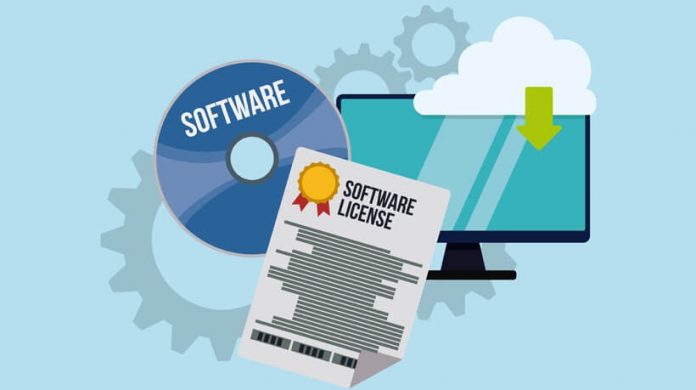

A legally applicable contract between a licensor and the purchaser or the author of the software that establishes the purchaser’s rights is a Software Licensing Agreement. It sets out the manner in which the software can be used and also list out the restrictions that are imposed on the software if any.
It also defines and protects the rights of the parties to the contract clearly and concisely. Most software license agreements that are in digital form are not presented to the purchaser until the completion of the purchase.

A free software license agreement grants the purchaser the rights to redistribute and modify the software and related components, while a proprietary software license agreement forbids this. The special license agreements prepared by the software companies for large business and government entities varies from those prepared for the general consumer.
These agreements also contain patent information and warranty provisions. There are certain agreements that make it necessary for the purchaser to sign and/or mail back the agreement. Although, the purchaser may surrender his right to use the software and thereby decline the software license agreement. This article covers in detail the drafting of a software licensing agreement.
Software is a set of instructions, programs or data that is used to operate a computer and execute tasks. In other words, the software commands a computer how to function. It’s a generic term used to refer to applications, scripts, and programs that run on devices such as PCs, mobile phones, tablets, and other smart devices. Software is different from hardware, which is the physical aspects of a computer that perform the work.
A license is an agreement of terms that permits an action. A software license allows the user to use the program. It is an agreement between a software company and a user. In most cases, one has to agree to the license agreement before installing or using the software.
An agreement between a company that creates and supplies an application, underlying source code, or related product and its end-user is called a Software Licensing Agreement. The purpose of this agreement is to protect the intellectual property of the software developer and to limit any claims against them that may arise from the use of the software. It provides definitions that legally binds the distribution and use of the software.
End-user rights, such as installation, warranties, and liabilities, along with the protection of the developer’s intellectual property are communicated through the agreement. Most software falls under one of two categories that have distinct differences in how they are viewed under copyright law:
Confidential information includes source code, invention records, research reports, production specifications, economic and market surveys, drawing and photographs, models, certain data for a licensee, software for a licensor, etc. Both the parties are keen to protect their confidential information such as trade secrets, a third-party confidential interest which they are under obligation to keep confidential.
This clause imposes restrictions and requirements on the “Receiving Party” regarding the use and disclosure of the confidential information of the “Disclosing Party”. Obligations can be adjusted to contemplate how the Receiving Party is allowed to access and use the Disclosing Party’s confidential information, and the potential risks to the later one if and when the information is misused.
If the licensee obtains from the escrow agent the right of access the source code escrow package, all such materials and information that comprises of the source code escrow package shall be maintained in strict confidence. If such a right is to be accessed only upon the occurrence of one of the pre-defined events then such an event must be properly documented by the Licensee. All confidential information may be used or disclosed only in accordance with the confidentiality provisions of the license agreement. This clause can be worded as:
“ Confidentiality obligations.”
The term “licensing fee” means an amount of money paid to an entity for a certain right or ability. In the present agreement “Licensing Fee” is an amount of money paid for the privilege to use, access, or maintain software programs. This clause can be worded as:
Milestone event

Amount to be paid
This is one of the highly negotiated clauses of software license agreements. Indemnity refers to a promise made by one party to save another party from loss or damage. The obligations under the clause are mutually decided by the parties, but they vary in degree and scope. The claims or liabilities arising out of the licensee’s use of the licensed software are covered by the Licensor’s indemnification which includes claims against infringement of third-party intellectual property rights by the licensed technology.
Whereas, indemnification of a licensee is limited to third-party claims only that are infringed by the licensed software. Both the parties have an obligation to maintain third-party liability otherwise the breaching party has to face legal proceedings for breach of IP rights. During the negotiations of this clause, the licensor agrees to indemnify for any claims in case the software breaches third-party intellectual property rights.
However, the licensee must inform the licensor of such claims immediately on receiving the information regarding the breach. This clause can be worded as:
“Indemnification:
Even after working to the best of one’s abilities, there is a possibility that a few expectations of the customer might not get fulfilled. It can be a guarantee of no software bugs, no downtime, or any other expectation. The Licensor shall negotiate the terms of the agreement that includes a disclaimer of warranties that would require the customer to accept it as it is or as available.
This passes on the risk to the users. This kind of warranty disclaimer can be of use if the software servers go down and the users are unable to use it for some time as it will protect the licensor from being blamed for the user’s lost data or business. This clause can be worded as:
The limitation of the liability clause is very important for both parties. This clause sets out the fact that the licensee accepts the software as it is, therefore he/she will not be able to sue for damages, and the licensor does not make any warranty for the software and its usage.
Licensees want to get rid of liability for indirect damages. They like better that liability for direct damages should be restricted to amounts paid under the agreement or a certain amount of money.
Whereas, a licensor negotiates for unlimited liability for both direct as well as indirect damages arising as a result of the breach of a term of the agreement and limited liability for direct as well as indirect damages excluding cases where liability arises as a result of a breach of IP rights, confidentiality obligations, or the grant of a license.
The limitation of liability clause in most agreements remains an outstanding issue until the contract is overdue for closure. The licensee generally agrees to extensive direct as well as indirect damages for losses arising out of breach of confidentiality and IP rights and the licensor agrees for extensive direct as well as indirect damages for losses arising from breach of third-party IP rights. This clause can be worded as:
The termination clause details the grounds and procedure to be followed by the parties in case they wish to terminate the agreement. The licensor may include that he/she can revoke or terminate the software at any point in time without any repercussions.
The software license agreement is a necessary tool that prevents abuse of the software and protects the rights of the owner. The software licenses are widely categorized as free software licenses, proprietary software licenses, and open-source software licenses.
Some of the important clauses that every software license should include are confidentiality clause, licensing fee clause, IP indemnification clause, warranties clause, limitation of liability clause, term and termination clause.
LawSikho has created a telegram group for exchanging legal knowledge, referrals, and various opportunities. You can click on this link and join: